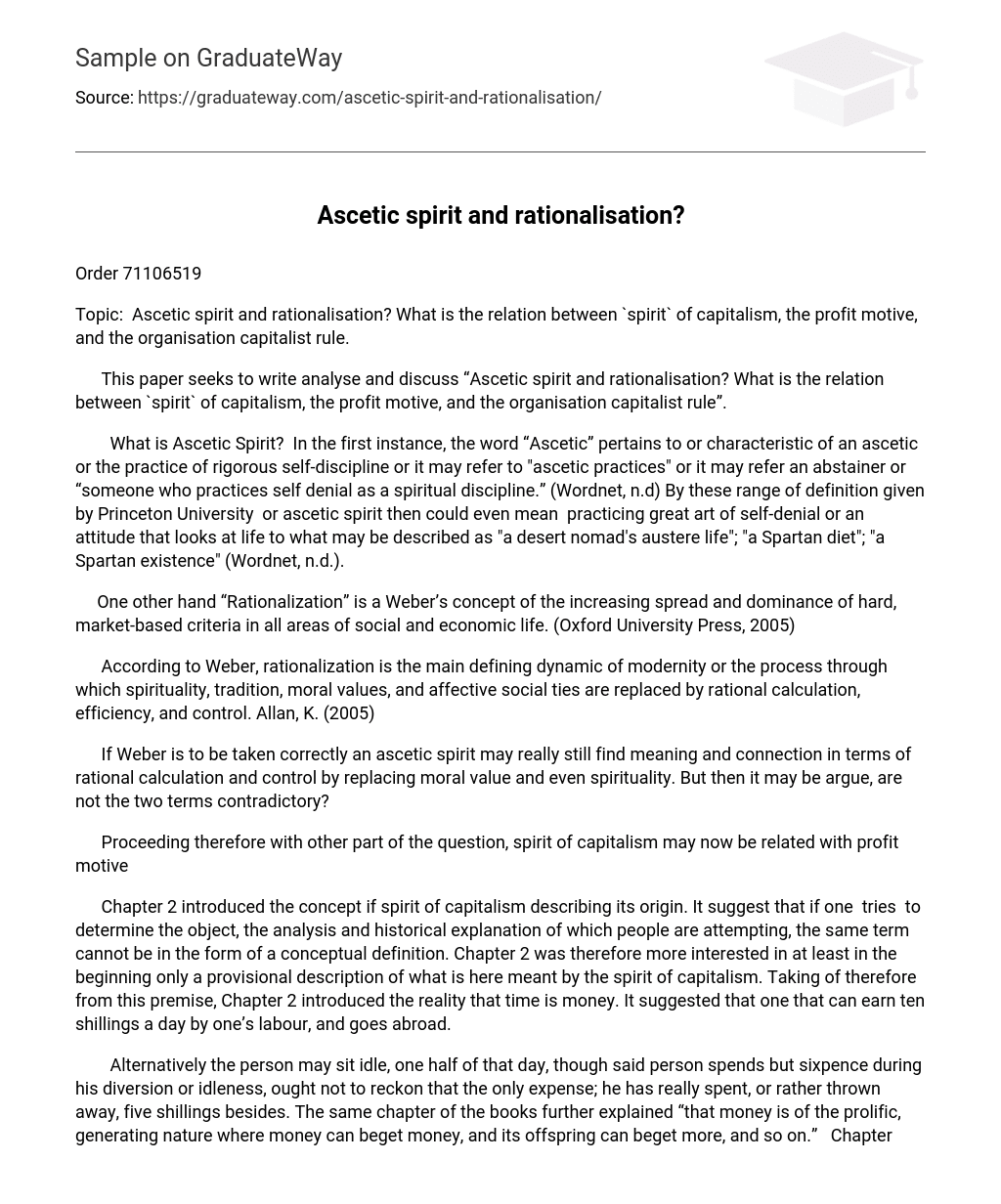What is Ascetic Spirit? In the first instance, the word “Ascetic” pertains to or characteristic of an ascetic or the practice of rigorous self-discipline or it may refer to “ascetic practices” or it may refer an abstainer or “someone who practices self denial as a spiritual discipline.” (Wordnet, n.d) By these range of definition given by Princeton University or ascetic spirit then could even mean practicing great art of self-denial or an attitude that looks at life to what may be described as “a desert nomad’s austere life”; “a Spartan diet”; “a Spartan existence” (Wordnet, n.d.).
One other hand “Rationalization” is a Weber’s concept of the increasing spread and dominance of hard, market-based criteria in all areas of social and economic life. (Oxford University Press, 2005) According to Weber, rationalization is the main defining dynamic of modernity or the process through which spirituality, tradition, moral values, and affective social ties are replaced by rational calculation, efficiency, and control. Allan, K. (2005)
If Weber is to be taken correctly an ascetic spirit may really still find meaning and connection in terms of rational calculation and control by replacing moral value and even spirituality. But then it may be argue, are not the two terms contradictory? Proceeding therefore with other part of the question, spirit of capitalism may now be related with profit motive
Chapter 2 introduced the concept if spirit of capitalism describing its origin. It suggest that if one tries to determine the object, the analysis and historical explanation of which people are attempting, the same term cannot be in the form of a conceptual definition. Chapter 2 was therefore more interested in at least in the beginning only a provisional description of what is here meant by the spirit of capitalism. Taking of therefore from this premise, Chapter 2 introduced the reality that time is money. It suggested that one that can earn ten shillings a day by one’s labour, and goes abroad.
Alternatively the person may sit idle, one half of that day, though said person spends but sixpence during his diversion or idleness, ought not to reckon that the only expense; he has really spent, or rather thrown away, five shillings besides. The same chapter of the books further explained “that money is of the prolific, generating nature where money can beget money, and its offspring can beget more, and so on.” Chapter 2 illustrated how a five shillings may turn into s six, seven and so forth until hundreds or thousands of founds. It explained that the more there is of it, the more it produces every turning, so that the profits rise quicker and quicker. (Chapter 2)
By the nature of money begetting money it would not be therefore not difficult to see the connection the spirit of capitalism with profit motive and that the two go together generally and even in a practical sense. After discussing other concepts of spirit of capitalism Chapter 2 also provided that “The concept spirit of capitalism is here used in this specific sense, [footnote6] it is the spirit of modern capitalism. For that we are here dealing only with Western European and American capitalism is obvious from the way in which the problem was stated. Capitalism existed in China, India, Babylon, in the classic world, and in the Middle Ages. But in all these cases, as we shall see, this particular ethos was lacking.” .
The above means clearly shows how the concept of spirit of capitalism is equated with the spirit of modern capitalism. But what is capitalist rule? By taking the meaning of capitalism to mean generally to an economic system in which the means of production are mostly privately owned and operated for profit, and in which distribution, production and pricing of goods and services are determined in a largely free market (Schrems, 2004) , it would not be difficult understand the meaning of capitalist rule which assumes the lordship of the capitalist in the factors of production where owners of labours would have to find the owner of capital the produce the possible economic combination to produce what is need by the people in the community.
It may be concluded that having and ascetic spirit may run contrary to what the meaning of rationalization which has the meaning of “” It would therefore mean that they could not go together. The possibility of coming together of the two is still possible if one adapts the definition of Weber on the matter. Each belongs to a different a different realm as one could not practice self denial under capitalism since the essence of capitalism is materialism, which seems to be the anti-thesis ascetic spirit. Capitalism feeds on materialism, while materialism must be the basic requirement of profit motive while profit motive feeds the capitalist which may practice capitalist rule.
References
- Chapter 2 “The Protestant Ethic and the Spirit of Capitalism”, URL, http: //www.ne.jp/asahi/moriyuki/abukuma/weber/world/ethic/pro_eth_1.html., Accessed November 15, 2007
- Oxford University Press (2005) Glossary {www document} URL (www.oup.com/uk/orc/bin/9780199253975/01student/glossary/glossary.htm), Accessed November 15, 2007
- Wordnet (n.d.) Glossary {www document} URL wordnet.princeton.edu/perl/webwn, Accessed November 15, 2007
- Allan, K. (2005) Explorations in Classical Sociological Theory: Seeing the Social World, Pine Forge Press
- Schrems, John (2004)Understanding Principles of Politics and the State by, PageFree Publishing , page 234





